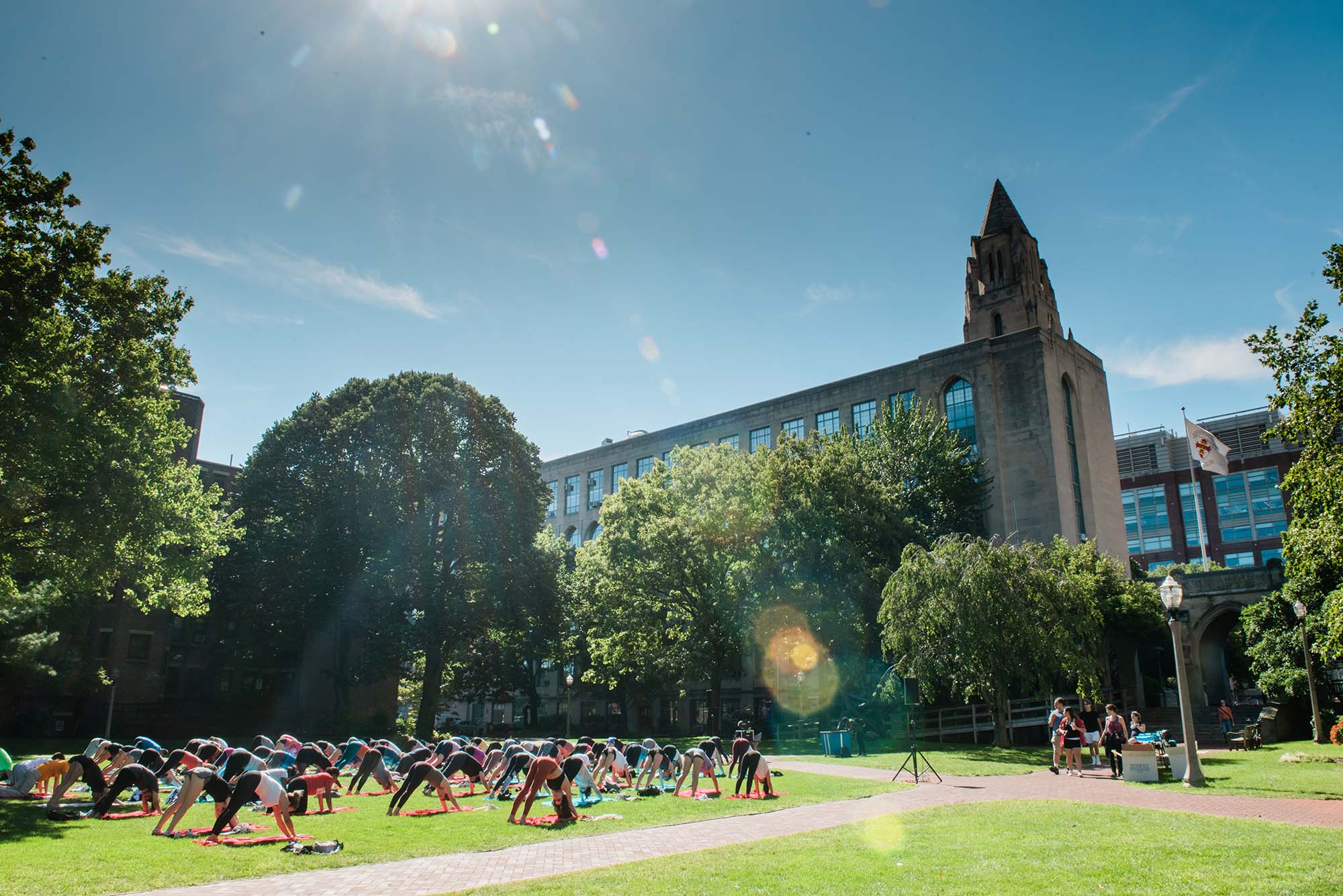New Name, Mission, and Website for Health Promotion & Prevention
Changes include a strengthened student health ambassador program and a new student advisory board to launch in fall 2022

BU Health Promotion & Prevention has a new name and new mission: enhancing students’ physical and mental health through education, campus community engagement, and student leadership development. Photo by Janice Checchio
New Name, Mission, and Website for Health Promotion & Prevention
Changes include a strengthened student health ambassador program and a new student advisory board to launch in fall 2022
The last two years have been challenging for everyone, and in the wake of the COVID-19 pandemic, there’s been an immense increase in the need for additional mental and physical health services on college campuses across the United States. The BU administration had signaled its support for providing more resources, even before the pandemic. President Robert A. Brown included the goal of establishing an integrated approach to wellness and health in his most recent strategic plan. And earlier this week, the University announced two changes to student well-being services, with the hope that they will lead to increased visibility and access to resources.
First, Wellness & Prevention Services (under the umbrella of Student Health Services [SHS]) has been renamed Health Promotion & Prevention, and has a new mission: enhancing students’ physical and mental health through education, campus community engagement, and student leadership development. The announcement follows the appointment last fall of Carrie Landa, director of SHS Behavioral Medicine, as BU’s inaugural executive director of student wellbeing. This new department within the Provost’s Office focuses on students’ holistic well-being across all dimensions—emotional, social, physical, professional.
“Boston University continues to recognize the critical role health and well-being play in students feeling a sense of belonging in our community and in their academic achievement,” Landa and Judy Platt, chief health officer and SHS executive director, write in a letter sent to the University March 16. “We look forward to enhancing support for students’ health and well-being through the unique missions of our offices, as well as through our shared campus vision where well-being is attainable for all students.”
Leading the revamped Health Promotion & Prevention is its director Katharine Mooney (SPH’12). Her team will focus on issues including substance use, sexual health, and mental health.
Mooney says the challenges of the previous two years have led to an immense increase in need. “We found there needs to be kind of an emphasis on awareness of the services and resources that are out there, and so we’ll be really leaning into how we can facilitate that in a student-centered way,” she says. “For some students maybe that doesn’t mean meeting one-on-one with a counselor, but attending a support group or a mindfulness session or a Tai Chi class at Marsh Chapel. And I think it’s a strategy that Student Health Services is really looking forward to building out so that students feel like we’re approachable and that they have more of a solid footing and understanding of what’s available.”
The department will support the prevention program Terriers Connect (which trains members of the BU community to notice signs of distress in students and aid them in getting help) and lead mindfulness workshops on topics like critical skills for resilience and movement. In addition, it will launch a new Student Health Advisory Board next fall, develop health literacy tools, and expand community outreach through programs like the Student Health Ambassadors, which trains undergrads how to talk to their peers about mental health, sexual well-being, and navigating the resources at BU.
“We know that peer messaging is so powerful,” Mooney says. “Student Health Services may have information or a message that we’re hoping to get out to the community, and students can deliver that same message and it will just resonate differently. So we’ve worked very collaboratively with our Student Health Ambassadors, who then consult on our programming and even our directions and the priorities that we’re taking as an office.”
Another priority will be helping students learn how to better navigate their own health care, with new tools on the website and possibly a workshop next fall meant to demystify such things as making appointments, health insurance, and referrals. “What happens when you call Behavioral Medicine and that person picks up the phone, what questions do they ask? What’s it like at that first appointment?” Mooney poses. “These are really simple things that a lot of students think of as a barrier to seeking help. And so if there’s a role for us to play in demystifying some of that and making it clear what to expect, we hope that that will also increase access.”
Mooney says the two distinct offices, both dedicated to student wellness and health, fill a crucial need.
“Students have to feel well in order to succeed academically, but also to feel a sense of belonging in our community and to make progress on their own personal and professional pursuits,” she says. “And so it’s an acknowledgment of that fact, and the desire to really make well-being an institutional value.”
Comments & Discussion
Boston University moderates comments to facilitate an informed, substantive, civil conversation. Abusive, profane, self-promotional, misleading, incoherent or off-topic comments will be rejected. Moderators are staffed during regular business hours (EST) and can only accept comments written in English. Statistics or facts must include a citation or a link to the citation.